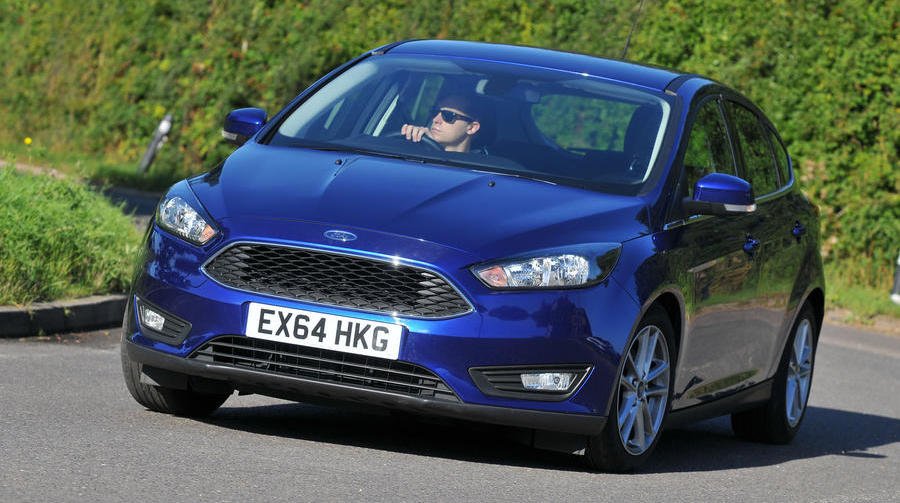The Ford Focus is so familiar and, to an extent, so respected, that it’s like legal tender on the used car market. The generation under discussion here is the Mk3 – but with a twist, since we’re looking at the facelifted car launched in 2014.
To its credit, where some manufacturers might be content with a set of sparkly LEDs for their mid-life update, Ford went further with the Focus, cramming in more driver assistance tech, a new touchscreen media system within a revised interior and a new engine line-up. It even found space for a larger centre cubby. However, for all its efforts, the cabin still looks and feels a rung below the Volkswagen Golf’s. Still, that’s fine because the Focus delights in other ways, not least its keener handling. Avoid the larger wheels and it’s comfortable, too.
Naturally there are thousands of these mid-life Mk3s for sale. Given that the Focus is a staple of company fleets, you’d think the diesel versions – they come in 1.5 and 2.0-litre guises – would dominate, but that honour goes to the petrols and the three-cylinder 1.0-litre engines in particular.
These come in 99bhp and 123bhp varieties, with the latter easily the most numerous. Its appeal lies in its price and performance, but don’t expect to achieve the claimed economy since it has to be worked hard to make decent progress. Fortunately, that’s no chore given how smooth and revvy it is.
The other petrols are 1.5-litre four-cylinder affairs offered in 148bhp and 180bhp forms. They’re scarce but are worth seeking out since they seem to have ducked the rumours concerning the possible unreliability of the smaller three-cylinder engines. Above them sits the 247bhp 2.0-litre in the Focus ST. The RS, meanwhile, deserves its own guide.
The 1.5-litre petrols are spirited performers and relaxed cruisers, but if you’re anticipating long motorway drives loaded with passengers and luggage, check out the torquier diesels. The 1.5 TDCi engines come in 94bhp and 123bhp guises, while the 2.0 TDCi puts out 148bhp. The 1.5’s predecessor, the 1.6 TDCi, continued to be sold for a year or so but was only around £100 cheaper. It’s less economical, but then the 1.5’s economy isn’t that impressive. Neither is inherently quiet but, with the facelift, Ford took the trouble to improve the Focus’s noise insulation, so they’re quite acceptable.
Forget entry-level Style trim. It’s thin on the ground and the steel wheels will just depress you. Zetec and Titanium were the big sellers, but between them sits Zetec Edition, which we like for its sports seats and heated windscreen – a godsend on frosty mornings. If you can’t stretch to the Focus ST, sniff out a 1.5T 182 in Zetec S Red Edition trim with black alloys and a bodykit. Can’t find one? ST-Line on a 1.0T 125 is more plentiful and fun, too, with its bodykit, sports seats and stiffened suspension, but go easy on the gas.
Titanium X: ‘X’ is for extra, with a rear-view camera, heated part-leather front seats, ambient lighting and bi-xenon lights. But be warned: as the car ages, subsequent buyers will be less impressed.
BUYER BEWARE
Engine The EcoBoost engine is also known as the EcoBoom engine for its occasional tendency to overheat and self-destruct. The source of the problem is a coolant pipe, called the degas pipe, that can come adrift and which was the subject of a workshop fix. The timing belt runs in oil and some have degraded rapidly leading to debris blocking the oil pump and destroying the engine, so check there are no odd noises or rattles.
Transmission If it's an early manual model, check the clutch pedal bite point isn't too high or the action too stuff. Some cars got through their clutch in as little as 10,000 miles. If it's an auto with the older six-speed, dry-clutch, Powershift transmission, check that it works smoothly and seamlessly.
Electrical Check the alternator's OK by, with the engine idling, switching on the interior light. If it pulses or flickers, there may be a problem. If the Stop/start system is erratic, the battery may be failing.
Steering and suspension Twirl the steering wheel listening for a twanging or clonking noise, a sign one of the front springs may have broken.
Wheels Check tyre pressure monitoring valves and wheel aren't corroding where they contact each other.
Body Check the windscreen is securely bonded and that the interior is free of damp.
Interior Check the DAB digital radio and connectivity systems work.
Need to know
The popular 1.0T Ecoboost 125 is claimed to be capable of 60mpg, but in reality you’ll be lucky to average more than 42mpg with mixed motoring. Compared with the official claims, the diesels are worse still. It’s one reason why today’s official economy figures are based on the more representative WLTP test.
The Focus diesel is a lot more reliable than its petrol counterpart, according to the latest What Car? reliability survey. It occupies 11th place, compared with the petrol down in 27th.
Zetec versions and upwards have what was then the latest 8.0in Ford Sync 3 touchscreen system. It’s not the most responsive nor the best laid out, but it is big and bold and includes a sat-nav.
Our pick
Ford Focus 1.0T 125 Titanium 5dr: Assuming your mileage is only average, you’ll get on fine with the eager-to-please, mid-power 1.0-litre motor. Titanium trim is a must for its emergency city braking, which is a surprising omission on lesser trims.
Wild card
Ford Focus ST-3: This facelifted ST is a much-improved hot hatch and closer in character to the brilliant Fiesta ST than before. ST-3 trim brings leather and powered Recaros plus rear parking sensors.
Ones we found
2015 Focus 1.5 TDCi 120 Zetec, 155,000 miles, £4295
2016 Focus 1.0T 125 Zetec, 74,000 miles, £6750
2017 Focus 1.0T 100 Zetec Edition, 26,000 miles, £8600
2018 Focus 1.5 TDCi 120 Titanium, 32,000 miles, £11,000

